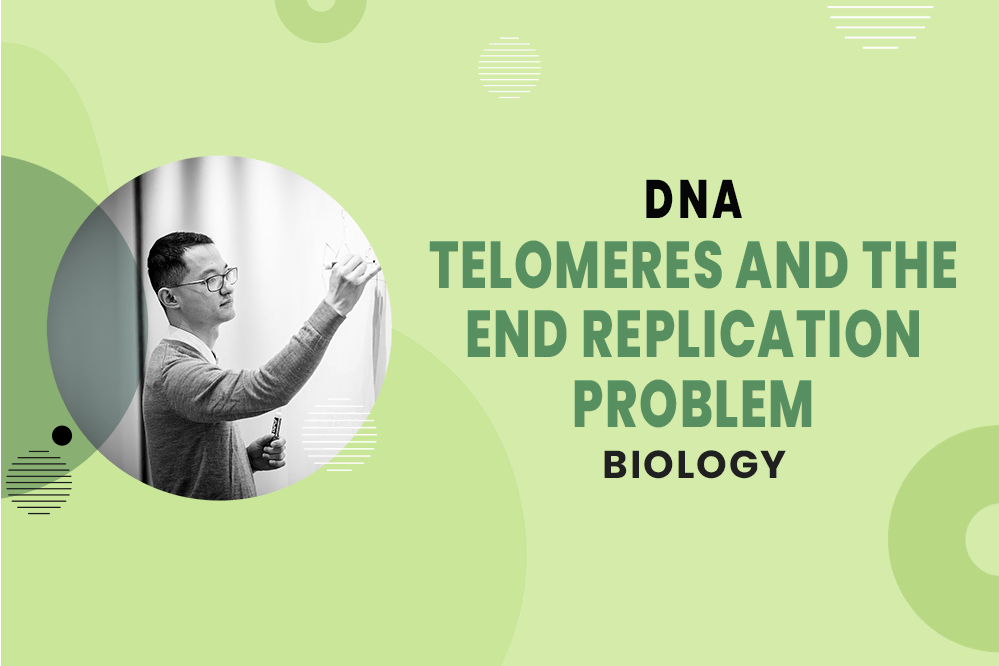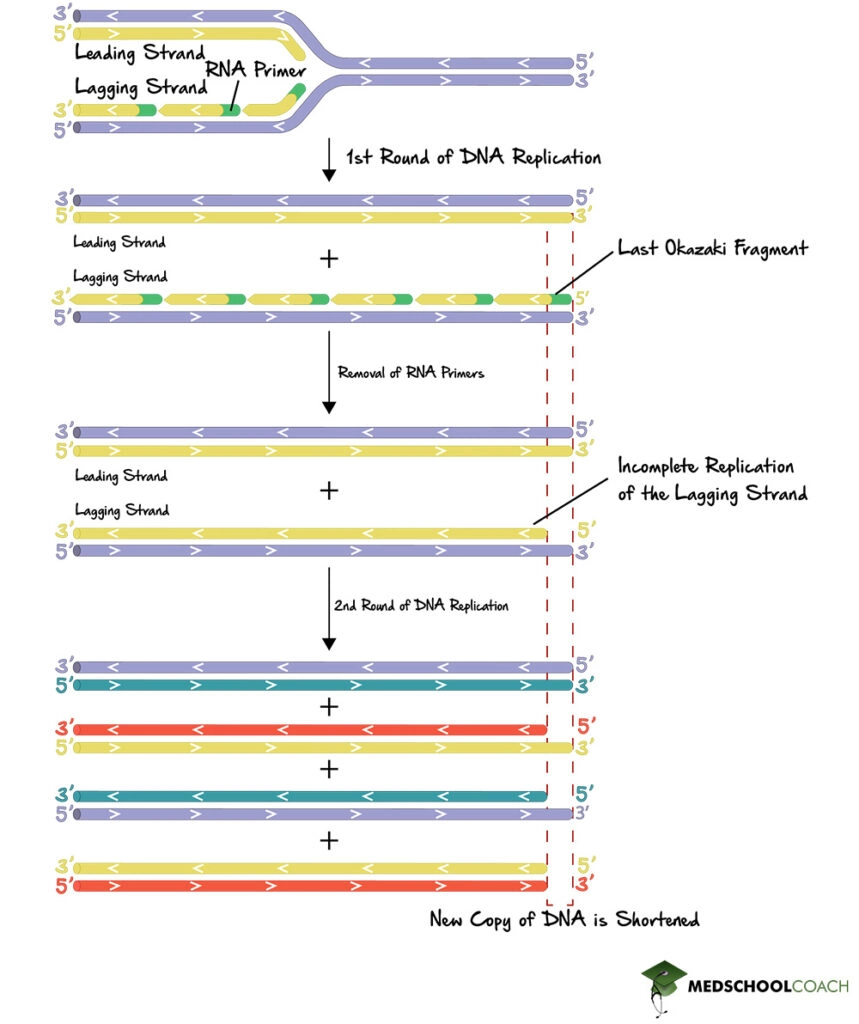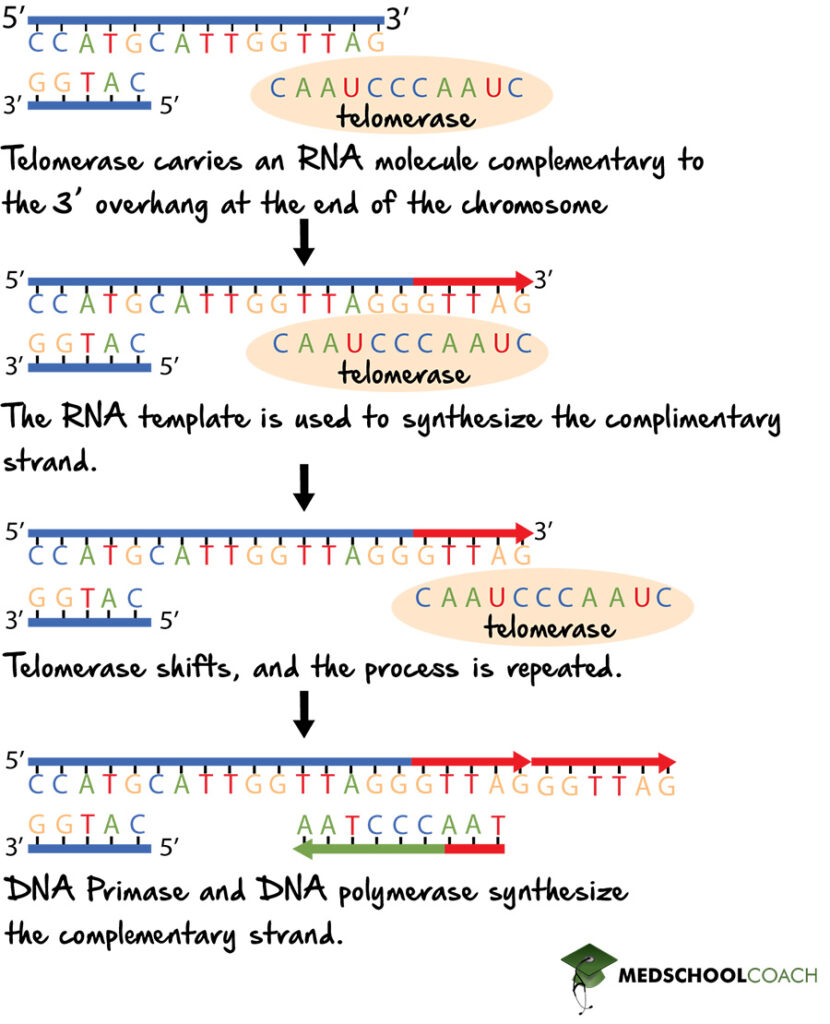
Telomeres and the DNA End Replication Problem
MCAT Biology - Chapter 1 - Section 2.3 - DNA - Telomeres and the DNA End Replication Problem
- Home
- »
- MCAT Masterclass
- »
- Biological and Biochemical Foundations of Living Systems
- »
- Biology
- »
- Telomeres and the DNA End Replication Problem – MCAT Biology
Sample MCAT Question - Telomeres and the DNA End Replication Problem
a) Loss of telomeres but no change to the organism’s genome.
b) Loss of telomeres and eventual loss of genes from the organism’s genome.
c) Loss of genes from the organism’s genome but no loss of telomeres.
d) Loss of telomeres on only half of all DNA strands in an organism’s genome.
B is correct. Loss of telomeres and eventual loss of genes from the organism’s genome.
A loss of funtion mutation in the gene that encodes telomerase would lead to an absence of telomerase in the organism’s cells. Since telomerase is necessary to maintain the ends of chromosomes (telomeres), loss of telomerase would certainly lead to loss of telomeres over time (this is the end replication problem). As DNA strands become shorter and shorter, eventually entire genes would be lost.
Get 1-on-1 MCAT Tutoring From a Specialist
With MCAT tutoring from MedSchoolCoach, we are committed to help you prepare, excel, and optimize your ideal score on the MCAT exam.
For each student we work with, we learn about their learning style, content knowledge, and goals. We match them with the most suitable tutor and conduct online sessions that make them feel as if they are in the classroom. Each session is recorded, plus with access to whiteboard notes. We focus on high-yield topics if you’re pressed for time. If you have more time or high-score goals, we meticulously cover the entire MCAT syllabus.
The DNA End Replication Problem
DNA replication at the ends of DNA is an important topic to understand for the MCAT exam. In eukaryotes, there is what is called the ‘end replication problem’ (Figure 1). Recall that during DNA replication, synthesis occurs at both the leading strand and the lagging strand. In the leading strand, which is synthesized in the 5′ to 3′ direction, nucleotides are added continuously by DNA polymerase. In terms of the lagging strand, which moves in the 3′ to 5′ direction, DNA is replicated in fragments since DNA polymerase can only add nucleotides in the 5′ to 3′ direction. In this way, multiple RNA primers are required so that DNA polymerase can function.
The discontinuous nature of DNA synthesis at the lagging strand results in short fragments of synthesized DNA called Okazaki fragments. Also, the RNA primers, since they are made of RNA, have to be replaced with DNA. This action is done by another DNA polymerase, which will connect each DNA strand to the one following it in a 5′ to 3′ direction. The problem, however, is that the last Okazaki fragment, at the end of the lagging strand, does not have a DNA strand before it. Therefore, the DNA polymerase cannot connect the last DNA strand to anything. In other words, there is not a 3′ hydroxyl group for DNA polymerase to use. In this way, since RNA is less stable than DNA, the RNA primer at the end of the lagging strand will simply degrade, which leaves an overhang where the lagging strand has failed to replicate the DNA fully.

The incomplete replication of the lagging strand is a problem because if left alone, the overhanging lagging strand will just degrade, and the linear chromosome will become shorter by several base pairs. If this happens every time DNA replication occurs, then the genome will get shorter each time, in which case organisms will start to lose genes over time.
Telomeres and Telomerase
Thankfully, eukaryotes have a way of dealing with the DNA end replication problem, which is through the use of telomeres. Telomeres are repeating nucleotide sequences that do not code for any protein products. However, when applied to the end of the chromosome, they prevent the chromosome from degrading. Moreover, in eukaryotes, an enzyme called telomerase helps to extend the length of telomeres, preventing the chromosomes from getting shorter during every round of DNA replication (Figure 2).
Telomerase is an RNA-dependent DNA polymerase, meaning that it uses an RNA template to synthesize DNA. Also, since telomerase is synthesizing DNA from RNA, it is a reverse transcriptase. Telomerase functions by binding to the 3′ overhang at the end of the chromosome. The overhang then gets extended using the RNA sequence and telomerase. Once the sequence is long enough, another primer can be added by DNA primase, and then DNA polymerase can extend that to the rest of the lagging strand. The enzyme DNA ligase can then link the DNA sequences together. It is important to note that sometimes telomerase can become activated by mistake in some cells, allowing for sustained growth of those cells. Disregulated telomerase functioning is one of the hallmarks of cancer formation.

Explore More MCAT Masterclass Chapters
Take a closer look at our entire MCAT Masterclass or explore our Biochemistry lessons below.

One-on-One Tutoring
Are you ready to take your MCAT performance to a whole new level? Work with our 99th-percentile MCAT tutors to boost your score by 12 points or more!
See if MCAT Tutoring can help me
Talk to our enrollment team about MCAT Tutoring

MCAT Go Audio Course
Engaging audio learning to take your MCAT learning on the go, any time, any where. You'll be on the way to a higher MCAT score no matter where you are. Listen to over 200+ lessons.

MCAT Practice Exams
Practice makes perfect! Our mock exams coupled with thorough explanations and in-depth analytics help students understand exactly where they stand.

MCAT Prep App
Access hundreds of MCAT videos to help you study and raise your exam score. Augment your learning with expert-created flashcards and a question banks.





